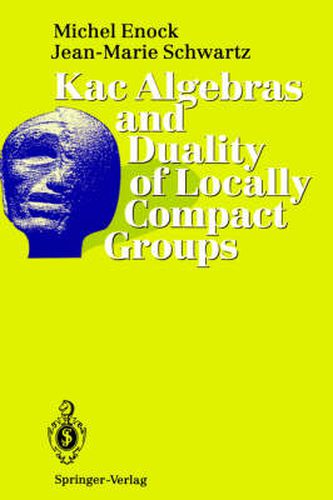Readings Newsletter
Become a Readings Member to make your shopping experience even easier.
Sign in or sign up for free!
You’re not far away from qualifying for FREE standard shipping within Australia
You’ve qualified for FREE standard shipping within Australia
The cart is loading…






This title is printed to order. This book may have been self-published. If so, we cannot guarantee the quality of the content. In the main most books will have gone through the editing process however some may not. We therefore suggest that you be aware of this before ordering this book. If in doubt check either the author or publisher’s details as we are unable to accept any returns unless they are faulty. Please contact us if you have any questions.
The theory of Kac lagebras and their duality, elaboratedindependently in the seventies by Kac and Vainermann and bythe authors of this book, has nowreached a state ofmaturity which justifies the publication of a comprehensiveand authoritative account in bookform. Further, the topic of quantum groups has recently become very fashionable andattracted the attention of more and more mathematicians andtheoretical physicists. However a good characterization ofquantum groups among Hopf algebras in analogy to thecharacterization of Lie groups among locally compact groupsis still missing. It is thus very valuable to develop thegeneraltheory as does this book, with emphasis on theanalytical aspects of the subject instead of the purelyalgebraic ones. While in the Pontrjagin duality theory of locally compactabelian groups a perfect symmetry exists between a group andits dual, this is no longer true in the various dualitytheorems of Tannaka, Krein, Stinespring and others dealingwith non-abelian locally compact groups. Kac (1961) andTakesaki (1972) formulated the objective of finding a goodcategory of Hopf algebras, containing the category oflocally compact groups and fulfilling a perfect duality. The category of Kac algebras developed in this book fullyanswers the original duality problem, while not yetsufficiently non-unimodular to include quantum groups. This self-contained account of thetheory will be ofinterest to all researchers working in quantum groups,particularly those interested in the approach by Lie groupsand Lie algebras or by non-commutative geometry, and moregenerally also to those working in C* algebras ortheoretical physics.
$9.00 standard shipping within Australia
FREE standard shipping within Australia for orders over $100.00
Express & International shipping calculated at checkout
This title is printed to order. This book may have been self-published. If so, we cannot guarantee the quality of the content. In the main most books will have gone through the editing process however some may not. We therefore suggest that you be aware of this before ordering this book. If in doubt check either the author or publisher’s details as we are unable to accept any returns unless they are faulty. Please contact us if you have any questions.
The theory of Kac lagebras and their duality, elaboratedindependently in the seventies by Kac and Vainermann and bythe authors of this book, has nowreached a state ofmaturity which justifies the publication of a comprehensiveand authoritative account in bookform. Further, the topic of quantum groups has recently become very fashionable andattracted the attention of more and more mathematicians andtheoretical physicists. However a good characterization ofquantum groups among Hopf algebras in analogy to thecharacterization of Lie groups among locally compact groupsis still missing. It is thus very valuable to develop thegeneraltheory as does this book, with emphasis on theanalytical aspects of the subject instead of the purelyalgebraic ones. While in the Pontrjagin duality theory of locally compactabelian groups a perfect symmetry exists between a group andits dual, this is no longer true in the various dualitytheorems of Tannaka, Krein, Stinespring and others dealingwith non-abelian locally compact groups. Kac (1961) andTakesaki (1972) formulated the objective of finding a goodcategory of Hopf algebras, containing the category oflocally compact groups and fulfilling a perfect duality. The category of Kac algebras developed in this book fullyanswers the original duality problem, while not yetsufficiently non-unimodular to include quantum groups. This self-contained account of thetheory will be ofinterest to all researchers working in quantum groups,particularly those interested in the approach by Lie groupsand Lie algebras or by non-commutative geometry, and moregenerally also to those working in C* algebras ortheoretical physics.